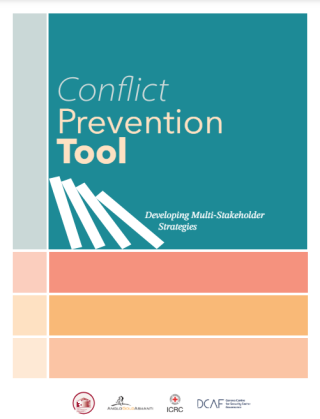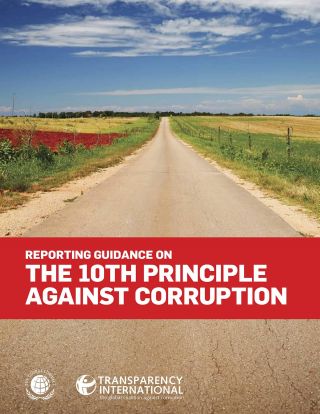Toolkits, guides and manuals
137 articles:
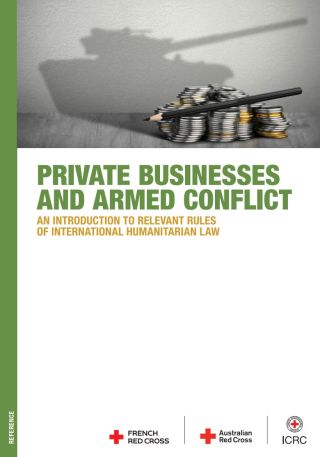
Private Businesses and Armed Conflict: An Introduction to Relevant Rules of International Humanitarian Law
French Red Cross, Australian Red Cross, ICRC
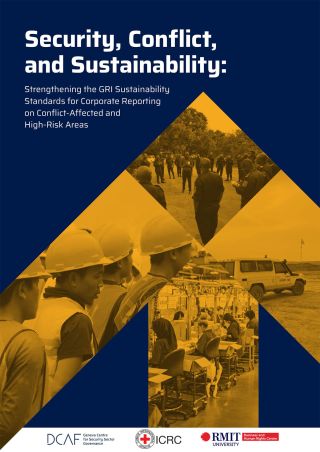
Security, Conflict, and Sustainability: Strengthening the GRI Sustainability Standards for Corporate Reporting on Conflict-Affected and High-Risk Areas
Managing and responding to human rights-related risks in conflict-affected and high-risk areas (CAHRAs) is challenging for many businesses. Yet, it is in these areas where the most egregious human rights abuses and violations of international humanitarian law (IHL) occur, and therefore must be a focus of attention for any business that wishes to operate sustainably and responsibly.

Mining Royalties: A Global Study of their Impact on Investors, Government, and Civil Society (The World Bank, 2006)
Mining Royalties: A Global Study of their Impact on Investors, Government, and Civil Society (The World Bank, 2006)

Child Rights and Security Handbook: An implementation companion to the Child Rights and Security Checklist (UNICEF, 2018)
Child Rights and Security Handbook: An implementation companion to the Child Rights and Security Checklist (UNICEF, 2018)

Site-level Grievance and Community Response Mechanisms: A Practical Design and Implementation Guide for the Resource Development Industry (MAC, 2015)
Site-level Grievance and Community Response Mechanisms: A Practical Design and Implementation Guide for the Resource Development Industry (MAC, 2015)

A Business Reference Guide: United Nations Declaration on the Rights of Indigenous Peoples (UN Global Compact, 2013)
A Business Reference Guide: United Nations Declaration on the Rights of Indigenous Peoples (UN Global Compact, 2013)

FPIC and the Extractive Industries: A Guide to Applying the Spirit of Free, Prior and Informed Consent in Industrial Projects (IIED, 2013)
FPIC and the Extractive Industries: A Guide to Applying the Spirit of Free, Prior and Informed Consent in Industrial Projects (IIED, 2013)

Good Practice Note: Addressing Grievances from Project-Affected Communities (IFC, 2009)
Good Practice Note: Addressing Grievances from Project-Affected Communities (IFC, 2009)

Mapping Grievance Mechanisms in the Business and Human Rights Arena (CSR Initiative, 2008)
Mapping Grievance Mechanisms in the Business and Human Rights Arena (CSR Initiative, 2008)

Rights-Compatible Grievance Mechanisms: A Guidance Tool for Companies and Their Stakeholders (CSR Initiative, 2008)
Rights-Compatible Grievance Mechanisms: A Guidance Tool for Companies and Their Stakeholders (CSR Initiative, 2008)

Resource/Extractive Companies and Indigenous Peoples Engagement: Recipe for Dialogue Project (BSR and FPW, 2004)
Resource/Extractive Companies and Indigenous Peoples Engagement: Recipe for Dialogue Project (BSR and FPW, 2004)

Integrating Human Rights into Environmental, Social and Health Impact Assessments (IPIECA, 2013)
Integrating Human Rights into Environmental, Social and Health Impact Assessments (IPIECA, 2013)

Preventing Conflict in Exploration: A Toolkit for Explorers and Developers (PDAC, World Vision Canada, CDA, 2012)
Preventing Conflict in Exploration: A Toolkit for Explorers and Developers (PDAC, World Vision Canada, CDA, 2012)

Conflict-Sensitive Approaches to Development, Humanitarian Assistance and Peacebuilding: Resource Pack (APFO, CECORE, CHA, FEWER, International Alert, Saferworld, 2004)
Conflict-Sensitive Approaches to Development, Humanitarian Assistance and Peacebuilding: Resource Pack (APFO, CECORE, CHA, FEWER, International Alert, Saferworld, 2004)

A Business Guide to Conflict Impact Assessment and Risk Management (UN Global Compact, 2002)
A Business Guide to Conflict Impact Assessment and Risk Management (UN Global Compact, 2002)

Use of Security Forces: Assessing and Managing Risks and Impacts Guidance for the Private Sector in Emerging Markets (IFC, 2017)
Use of Security Forces: Assessing and Managing Risks and Impacts Guidance for the Private Sector in Emerging Markets (IFC, 2017)

Private Security Governance National Action Plans (NAPS) on Business and Human Rights (DIHR, Danish Institute for Human Rights & DCAF, Geneva Centre for Security Sector Governance, 2019)
Private Security Governance National Action Plans (NAPS) on Business and Human Rights (DIHR, Danish Institute for Human Rights & DCAF, Geneva Centre for Security Sector Governance, 2019)

Legislative Guidance Tool for States to Regulate Private Military and Security Companies (DCAF, 2016)
This Guidance Tool is aimed at parliamentarians and law and policymakers who undertake to develop new or to update existing laws for national regulation of the private military and security industry.

Management System for Quality of Private Security Company Operations - Requirements with Guidance (PSC.1 Standard)
Management System for Quality of Private Security Company Operations - Requirements with Guidance (PSC.1 Standard)

Engaging Private Security Providers: A Guideline for Non-Governmental Organisations (EISF, 2011)
Engaging Private Security Providers: A Guideline for Non-Governmental Organisations (EISF, 2011)

Private Military and Security Companies and Gender – (Tool 10) (DCAF, OSCE/ODIHR, UN-INSTRAW, 2008)
Private Military and Security Companies and Gender – (Tool 10) (DCAF, OSCE/ODIHR, UN-INSTRAW, 2008)

The Sarajevo Client Guidelines for the Procurement of Private Security Companies (SEESAC, 2006)
The Sarajevo Client Guidelines for the Procurement of Private Security Companies (SEESAC, 2006)

Recommendations for Hiring Private Security Providers (DCAF, ICRC, Socios Peru, and PeaceNexus, 2016)
Recommendations for Hiring Private Security Providers (DCAF, ICRC, Socios Peru, and PeaceNexus, 2016)

Ten Steps to Promote the Voluntary Principles on Security and Human Rights: The Peruvian Working Group Model (DCAF, ICRC, Socios Peru, and PeaceNexus, 2016)
Ten Steps to Promote the Voluntary Principles on Security and Human Rights: The Peruvian Working Group Model (DCAF, ICRC, Socios Peru, and PeaceNexus, 2016)

From Commitment to Impact: A Guide for Local Working Groups on Business, Security and Human Rights (DCAF and Fund For Peace FFP)
From Commitment to Impact: A Guide for Local Working Groups on Business, Security and Human Rights (DCAF and Fund For Peace FFP)

Doing Responsible Business in Armed Conflict: Rights, Risks and Responsibilities (Australian Red Cross and RMIT University)
Doing Responsible Business in Armed Conflict: Rights, Risks and Responsibilities (Australian Red Cross and RMIT University)

Human Rights Impact Assessment: Guidance and Toolbox (Danish Institute for Human Rights DIHR)
Human Rights Impact Assessment: Guidance and Toolbox (Danish Institute for Human Rights DIHR)

Human Rights and Business Learning Tool (Office of the UN High Commissioner for Human Rights and Global Compact, OHCHR and UNGC, 2013)
Human Rights and Business Learning Tool (Office of the UN High Commissioner for Human Rights and Global Compact, OHCHR and UNGC, 2013)

Indigenous Peoples and the Oil and Gas Industry: Context, Issues and Emerging Good Practice (DCAF and ICRC)
Indigenous Peoples and the Oil and Gas Industry: Context, Issues and Emerging Good Practice (DCAF and ICRC)

Seven Indicators of Corporate Best Practice in International Humanitarian Law (Australian Red Cross and RMIT University)
Seven Indicators of Corporate Best Practice in International Humanitarian Law (Australian Red Cross and RMIT University)

Learn about International Humanitarian Law (IHL): Free online training for businesses (Australian Red Cross)
Learn about International Humanitarian Law (IHL): Free online training for businesses (Australian Red Cross)

A Guide for Business: How to Develop a Human Rights Policy_Second edition (the UN Global Compact UNGC and OHCHR, 2015)
A Guide for Business: How to Develop a Human Rights Policy_Second edition (the UN Global Compact UNGC and OHCHR, 2015)

Voluntary Principles on Security and Human Rights Implementation Guidance Tools (ICMM, ICRC, IFC and IPIECA, 2011)
Voluntary Principles on Security and Human Rights Implementation Guidance Tools (ICMM, ICRC, IFC and IPIECA, 2011)

Auditing Implementation of Voluntary Principles on Security and Human Rights (Global Compact Network Canada, 2015)
Auditing Implementation of Voluntary Principles on Security and Human Rights (Global Compact Network Canada, 2015)

Measuring Quality of Relationships: Using ICMMs‚ Understanding Company-Community Relations‚ Toolkit (Shift, 2021)
Measuring Quality of Relationships: Using ICMMs‚ Understanding Company-Community Relations‚ Toolkit (Shift, 2021)

The Voluntary Principles on Security and Human Rights: An Implementation Toolkit for Major Project Sites (World Bank Group Multilateral Investment Guarantee Agency and Anvil Mining, 2008)
The Voluntary Principles on Security and Human Rights: An Implementation Toolkit for Major Project Sites (World Bank Group Multilateral Investment Guarantee Agency and Anvil Mining, 2008)

Voluntary Principles on Security and Human Rights: Performance Indicators (International Alert, 2008)
Voluntary Principles on Security and Human Rights: Performance Indicators (International Alert, 2008)

Voluntary Principles on Security & Human Rights National-Level Implementation Guidance Note (FFP & International Alert, 2010)
Voluntary Principles on Security & Human Rights National-Level Implementation Guidance Note (FFP & International Alert, 2010)

Voluntary Principles on Security and Human Rights Implementation Guideline - An extended summary (BP, 2008)
Voluntary Principles on Security and Human Rights Implementation Guideline - An extended summary (BP, 2008)

Guidebook for Conflict Management in Mining Industry of the Kyrgyz Republic (Eurasia Foundation of Central Asia and Kalikova & Associates, 2017)
Guidebook for Conflict Management in Mining Industry of the Kyrgyz Republic (Eurasia Foundation of Central Asia and Kalikova & Associates, 2017)

Policy Brief Guidance: Gender and Private Security Regulation (DCAF, OSCE/ODIHR and UN Women)
Policy Brief Guidance: Gender and Private Security Regulation (DCAF, OSCE/ODIHR and UN Women)

Business and International Humanitarian Law: An Introduction to the Rights and Obligations of Business Enterprises under International Humanitarian Law (ICRC, 2006)
Business and International Humanitarian Law: An Introduction to the Rights and Obligations of Business Enterprises under International Humanitarian Law (ICRC, 2006)

Human rights due diligence in conflict-affected settings: Guidance for extractives industries (International Alert, 2018)
Human rights due diligence in conflict-affected settings: Guidance for extractives industries (International Alert, 2018)

Multinationals and Conflict – International Principles and Guidelines for Corporate Responsibility in Conflict-affected Areas (SOMO, 2014)
Multinationals and Conflict – International Principles and Guidelines for Corporate Responsibility in Conflict-affected Areas (SOMO, 2014)

A Seat at the Table: Capacities and Limitations of Private Sector Peacebuilding (CDA Collaborative, Africa Center for Dispute Settlement, PRIO, 2018)
A Seat at the Table: Capacities and Limitations of Private Sector Peacebuilding (CDA Collaborative, Africa Center for Dispute Settlement, PRIO, 2018)

Training Tool: Doing Business in Conflict-affected Countries (UN Global Compact and Maplecroft, 2013)
Training Tool: Doing Business in Conflict-affected Countries (UN Global Compact and Maplecroft, 2013)

Human Rights Due Diligence in High Risk Circumstances: Practical Strategies for Businesses (Shift, 2015)
Human Rights Due Diligence in High Risk Circumstances: Practical Strategies for Businesses (Shift, 2015)

Making Women Workers Count A Framework for Conducting Gender-Responsive Due Diligence in Supply Chains (BSR and laudes foundation 2019)
Making Women Workers Count A Framework for Conducting Gender-Responsive Due Diligence in Supply Chains (BSR and laudes foundation 2019)

From Red to Green Flags - The Corporate Responsibility to Respect Human Rights in High-risk Countries (Institute for Human Rights and Business, 2011)
From Red to Green Flags - The Corporate Responsibility to Respect Human Rights in High-risk Countries (Institute for Human Rights and Business, 2011)

Guidance on Responsible Business in Conflict-Affected and Hight-Risk Areas: A Resource for Companies and Investors (UN Global Compact and Principles for Responsible Investment Initiative, 2010)
Guidance on Responsible Business in Conflict-Affected and Hight-Risk Areas: A Resource for Companies and Investors (UN Global Compact and Principles for Responsible Investment Initiative, 2010)

Reporting Business and Human Rights: A Handbook for Journalists, Communicators and Campaigners
Reporting Business and Human Rights: A Handbook for Journalists, Communicators and Campaigners

Practical Guidance on Human Rights and Security in the Colombian ASM Industry (DCAF and the Alliance for Responsible Mining, 2021)
Practical Guidance on Human Rights and Security in the Colombian ASM Industry (DCAF and the Alliance for Responsible Mining, 2021)

Conflict-Sensitive Business Practice: Guidance for Extractive Industries (International Alert, 2005)
Conflict-Sensitive Business Practice: Guidance for Extractive Industries (International Alert, 2005)

Enabling Economies of Peace - Public Policy for Conflict-Sensitive Business (Commissioned by the UN Global Compact, 2005)
Enabling Economies of Peace - Public Policy for Conflict-Sensitive Business (Commissioned by the UN Global Compact, 2005)

War, Law and Business: A free immersive e-learning module on international humanitarian law
War, Law and Business: A free immersive e-learning module on international humanitarian law

Oil and Gas Sector Guide on Implementing the UN Guiding Principles on Business and Human Rights (Shift and IHRB, 2013)
Oil and Gas Sector Guide on Implementing the UN Guiding Principles on Business and Human Rights (Shift and IHRB, 2013)

Human Rights Due Diligence Process: A Practical Guide to Implementation for Oil and Gas Companies (IPIECA, 2012)
Human Rights Due Diligence Process: A Practical Guide to Implementation for Oil and Gas Companies (IPIECA, 2012)

Oil and Gas Industry Guidance on Voluntary Sustainability Reporting (IPIECA, API and OGP, 2015)
Oil and Gas Industry Guidance on Voluntary Sustainability Reporting (IPIECA, API and OGP, 2015)

10 Steps to Maintain Security in Compliance with Human Rights(Voluntary Principles Initiative VPI, 2022)
10 Steps to Maintain Security in Compliance with Human Rights(Voluntary Principles Initiative VPI, 2022)

Guiding Principles on Business and Human Rights: Implementing the United Nations "Protect, Respect and Remedy" Framework (United Nations Human Rights, 2011)
Guiding Principles on Business and Human Rights: Implementing the United Nations "Protect, Respect and Remedy" Framework (United Nations Human Rights, 2011)

Factsheet: How is responsible security management integral to human rights due diligence?
Factsheet: How is responsible security management integral to human rights due diligence?

The Corporate Responsibility to Respect Human Rights: An Interpretive Guide (United Nations Human Rights, 2012)
The Corporate Responsibility to Respect Human Rights: An Interpretive Guide (United Nations Human Rights, 2012)

Shared Space Under Pressure: Business Support for Civic Freedoms and Human Rights Defenders (BHRRC & ISHR, 2018)
Shared Space Under Pressure: Business Support for Civic Freedoms and Human Rights Defenders (BHRRC & ISHR, 2018)

Factsheet: How should companies manage security and human rights challenges related to artisanal and small-scale mining?
Factsheet: How should companies manage security and human rights challenges related to artisanal and small-scale mining?

Gender-responsive Due Diligence for Business Actors: Human Rights-Based Approaches (Geneva Academy, 2018)
Gender-responsive Due Diligence for Business Actors: Human Rights-Based Approaches (Geneva Academy, 2018)

How can companies respect the rights of indigenous peoples when addressing security and human rights challenges?
How can companies respect the rights of indigenous peoples when addressing security and human rights challenges?

Doing Business with Respect for Human Rights: A Guidance Tool for Companies (Shift, Oxfam and Global Compact Network Netherlands, 2016)
Doing Business with Respect for Human Rights: A Guidance Tool for Companies (Shift, Oxfam and Global Compact Network Netherlands, 2016)

Factsheet: How can companies respect the rights of human rights defenders when addressing security-related challenges?
Factsheet: How can companies respect the rights of human rights defenders when addressing security-related challenges?

What makes stakeholder engagement meaningful? 5 insights from practice (UN Global Compact Network Germany)
What makes stakeholder engagement meaningful? 5 insights from practice (UN Global Compact Network Germany)

Heightened Human Rights Due Diligence for Business in Conflict-Affected Contexts: A Guide (UNDP and UN Working Group on Business and Human Rights, June 2022)
Heightened Human Rights Due Diligence for Business in Conflict-Affected Contexts: A Guide (UNDP and UN Working Group on Business and Human Rights, June 2022)

Human Rights Translated 2.0: A Business Reference Guide (Monash University, OHCHR, UNGC, 2017)
Human Rights Translated 2.0: A Business Reference Guide (Monash University, OHCHR, UNGC, 2017)

DCAF SSR Paper 13 - Business and Security Sector Reform: The Case for Corporate Security Responsibility (Mendes, 2015)
DCAF SSR Paper 13 - Business and Security Sector Reform: The Case for Corporate Security Responsibility (Mendes, 2015)

OECD Due Diligence Guidance for Responsible Supply Chains of Minerals from Conflict-Affected and High-Risk Areas (2016)
OECD Due Diligence Guidance for Responsible Supply Chains of Minerals from Conflict-Affected and High-Risk Areas (2016)

Practical actions for companies to identify and address the worst forms of child labour in mineral supply chains (OECD, 2017)
Practical actions for companies to identify and address the worst forms of child labour in mineral supply chains (OECD, 2017)

Human Rights in the Mining and Metals Industry - Overview, Managment Approach and Issues (ICMM, 2009)
Human Rights in the Mining and Metals Industry - Overview, Managment Approach and Issues (ICMM, 2009)

Start Here: Sustainability for Exploration, Development and Small Producing Mining Companies (NBS, 2014)
Start Here: Sustainability for Exploration, Development and Small Producing Mining Companies (NBS, 2014)

Women, Communities and Mining: The Gender Impacts of Mining and the Role of Gender Impact Assessment (Oxfam Australia, 2009)
Women, Communities and Mining: The Gender Impacts of Mining and the Role of Gender Impact Assessment (Oxfam Australia, 2009)

Due Diligence Guidance for Meaningful Stakeholder Engagement in the Extractive Sector (OECD, 2017)
Due Diligence Guidance for Meaningful Stakeholder Engagement in the Extractive Sector (OECD, 2017)

A Strategic Approach to Early Stakeholder Engagement - Good Practice Handbook for Junior Companies in the Extractive Industries (IFC, 2013)
A Strategic Approach to Early Stakeholder Engagement - Good Practice Handbook for Junior Companies in the Extractive Industries (IFC, 2013)

Stakeholder Engagement: A Good Practice Handbook for Companies Doing Business in Emerging Markets (IFC, 2007)
Stakeholder Engagement: A Good Practice Handbook for Companies Doing Business in Emerging Markets (IFC, 2007)

Human Rights and State-Investor Contracts: Guidance and Assessment Tool for Company Negotiators (DIHR, 2014)
Human Rights and State-Investor Contracts: Guidance and Assessment Tool for Company Negotiators (DIHR, 2014)

How Business Can Encourage Governments to Fulfil their Human Rights Obligations (United Nations Global Compact, 2010)
How Business Can Encourage Governments to Fulfil their Human Rights Obligations (United Nations Global Compact, 2010)
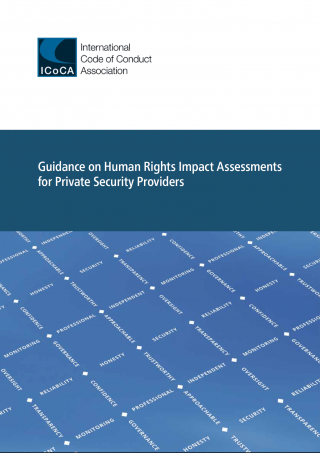
The purpose of this guidance document is to help private security companies conduct human rights due diligence (HRDD).

DCAF – Geneva Centre for Security Sector Governance
Business and Security Division
www.businessandsecurity.dcaf.ch
Chemin Eugène-Rigot 2E,
CH-1202 Geneva Switzerland
Tel: +41 (0) 22 730 94 18
Contact us

International Committee of the Red Cross (ICRC)
www.icrc.org
Avenue de la Paix 19, 1202 Geneva, Switzerland
Economic Adviser
Department of International Law and Policy
Tel: +41 (0) 22 734 6001
Contact us





















